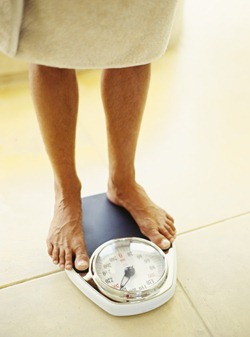
Happy New Year for 2013! I hope you all had a great Christmas.
At this time of year, many of you will be making New Year’s resolutions. Maybe you’ve resolved to finally lose those extra pounds, or perhaps you have just decided to eat more healthily.
If you are thinking about changing your diet, I thought I’d give you some food for thought! It’s really important that we make the right kind of resolution – and this article will help you to make sensible resolutions regarding your diet.
Why Change Your Diet?
The best way that you can lose weight and ensure that you have a healthy life is to change your diet. Most people eat too much of the wrong kind of food, and not enough of the food that we are designed for.
We’re effectively putting the wrong fuel in our bodies. Imagine you had a petrol engine car. What would happen if you put diesel in the tank? You’d have a problem, that’s for sure! Your body is amazingly adaptive, and you can survive even though you’re putting in the wrong fuel. But while you might survive, you won’t thrive.
When you eat the wrong foods, the result is always the same: ill-health, low energy levels and weight gain. As well as causing you to put on weight, a poor quality diet increases your risk for Type 2 diabetes, Heart disease, Cancer and Alzheimer’s disease.
The Worst Foods
One of the biggest culprits for weight gain is sugar. Sugar is a carbohydrate that is easily absorbed by your body – and it’s not a natural part of the human diet. Human beings have been around for 200,000 years, but sugar and other refined carbohydrates have only recently become part of our diet.
Your body is not “designed” to cope with repeated doses of easily absorbed carbohydrates – and sugar in all it’s forms is a particular problem. Hot on the heels of sugar are starchy foods – these are also easily absorbed by your body.
Here’s a list of the top 6 foods to avoid:
- Sweetened drinks
- Granulated sugar (don’t add sugar to tea or coffee)
- Bread (especially white bread)
- Pasta
- Breakfast cereals (usually have masses of added sugar)
- Sweets, cakes & muffins
The Insulin Connection
Sugar and other easily absorbed carbohydrates cause an increase in the hormone insulin. Repeatedly flooding your system with insulin results in weight-gain and other health problems (such as type 2 diabetes). Insulin stops your body from using fat as fuel, and causes your body to store fat. The end result of a diet packed full of carbohydrates is that your body has too much stored fat, you gain weight and your health suffers.
Fat was never meant to be locked away in long term storage – stuck on your belly, your backside and your arms. Fat is meant to be used as a fuel by your body – but if your diet is full of sugar & refined carbs, you can’t burn that fat.
The Low-Fat Myth
For years we’ve been told to avoid fatty foods like the plague. This advice is not based on sound scientific evidence – the most recent research clearly shows that eating fat does not make you fat. In fact, when you avoid fat, you usually eat more carbohydrates.
Many “low fat” products are high in sugar – which caused your weight problem in the first place. We’ve been eating less and less fat over the past 20 years, and more and more carbohydrates – and our weight has ballooned. You work it out!
Withdrawal Symptoms!
When you stop eating sugar and refined carbohydrates, you might experience some initial discomfort, and possibly even reduced energy levels. This is normal, and it will pass. Your body is so used to getting quick “sugar-hits”, that it can’t mobilise your fat stores and use them as fuel.
Not everyone experiences this, but if you do – stay strong. Your body will make the necessary changes, and before you know it you will switch into a “fat-burning” mode.
You may find yourself craving sugary foods as you move to a healthier diet. Remember that your new dietary habits are not the problem – your old “unnatural” habits are the problem. You don’t “need” sugar – this is just a common myth. When you change your diet, you are correcting years of abuse – and your body will need time to get through this transition.
Give yourself time, be strong, and look forward to more energy, reduced weight and better health!
I have personally not eaten sugar or refined carbohydrates in a very long time – it’s probably 6 months since I last had a slice of bread – yet I’m full of energy! I have never been fitter or leaner, and I teach several high-energy exercise classes each week.
Make a Resolution
The resolution I suggest is simple: give up sugar. Remember: sugar is toxic. Stop eating sugar – you’ll feel better, lose weight and be healthier. It’s that simple. Do your best to avoid the foods mentioned above.
Need Some Extra Help?
If you live in Co Clare, why not work with us. We provide a One-to-One Weight Loss coaching service, as well as a Body Transformation Programme. We’ll show you how to adapt your lifestyle so that weight loss happens effortlessly – without starvation, calorie counting or food supplements.
Watch this space for ideas, recipes and suggestions that will help you make the transition to a healthier diet. Why not join us on Facebook for more free weight-loss ideas?




